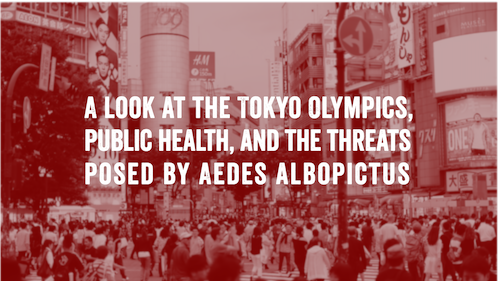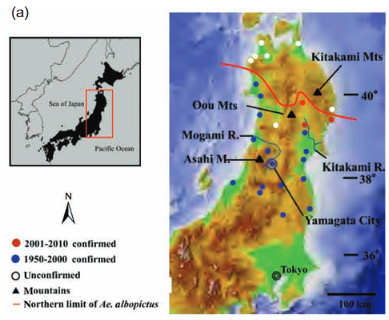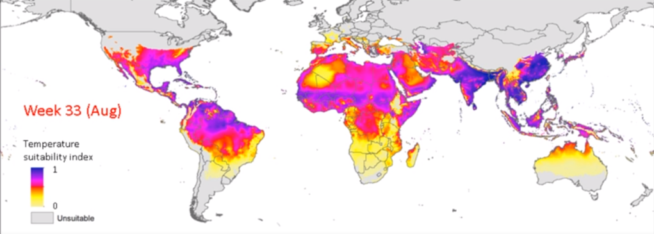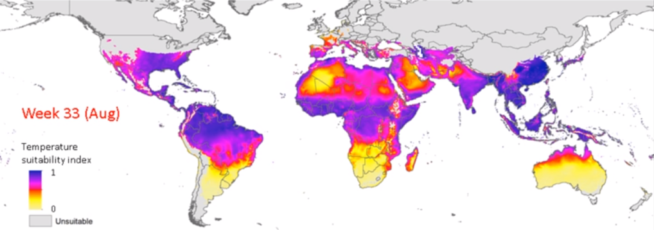- by Alison
Tokyo Olympics, public health, and the threats posed by Aedes albopictus

The Tokyo Olympics and other mass gatherings provide the perfect opportunity for many dangerous vectors. Sporting, religious and cultural events often attract large numbers of people from different parts of the world, bringing with them both vectors themselves and the viruses they carry. With Tokyo’s preparations for hosting the 2020 Olympic and Paralympics Games in less than 18 months well underway, we explore the risk of a dengue outbreak during the games, drawing parallels with the Zika threat during the 2016 games in Brazil. Let’s begin by taking a look at the status of dengue and its Aedes vector in Japan.
At a global level, the Asian tiger mosquito (as Aedes albopictus) is a secondary, yet still very important, dengue vector. It’s the main dengue vector invading temperate and semi-temperate countries; its spread fuelled by an increase in global travel and the used tire trade. Yet very dry and very cold weather, along with improvements in the way unwanted materials (such as used tires) are handled, is preventing the mosquito from establishing itself in some areas – inhibiting its march forward.
Aedes albopictus has been present in Japan for some time. According to the Journal of Medical Entomology:
“During World War II, conscripted ships brought dengue fever into Japan from epidemic areas, and it became prevalent in the western parts of Japan.”
A research article published in 2015 highlights Japan as one of the top ten countries for Aedes albopictus mosquitoes. Researchers confirmed the mosquito’s presence in an article published in Geospatial Health a year earlier, in 2014:

Distribution of Ae. albopictus confirmed areas in the Tohoku region of Honshu in 2012 and the northern limit of Ae. albo-pictus. (b) Mosquito collection sites in Yamagata city (1998-2010) via Geospatial Health
Dengue in Japan
With Aedes albopictus established in Japan, dengue outbreaks are a real possibility. Japan experienced an unexpected outbreak during the summer of 2014, the country’s first autonomous transmission for 70 years.
The videos published in this 2014 research article show that Japan’s climate would allow Aedes albopictus to transmit the dengue virus during the summer months:

Aedes albopictus temperature suitability for the introduction of dengue transmission throughout an average year. Source: Parasites & Vectors
And allow Aedes albopictus to maintain that transmission during the summer months:

Aedes albopictus temperature suitability for the persistence of dengue transmission throughout an average year. Source: Parasites & Vectors
The dengue threat to public health during the Tokyo Olympics
Japan is in the midst of preparing to host the 2020 Summer Olympics and 2020 Summer Paralympics in Tokyo. The games will take place during the summer months when temperatures can rise to over 30 °C, raising the risk of dengue transmission.
Despite the fact that dengue and tourism can be an unhealthy combination, millions of people from Japan and all over the world are expected to attend the games. The host city will welcome thousands of athletes along with staff, officials, volunteers, and spectators. The large influx of people poses potential health risks, including a heightened risk of dengue.
With Aedes albopictus established in Japan, the country must prepare to counteract any dengue threat during the games. It finds itself in a situation similar to that faced by Brazil ahead of the 2016 games. Brazil 2016 took place as Zika spread rapidly across South and Central America. Zika, like dengue, yellow fever, and chikungunya, can be spread by Aedes mosquitoes.
Zika threatened the Brazil Olympics
The games were due to take place in August 2016, during the Brazilian winter. Just over a year earlier, in May 2015, Brazil reported its first ever case of Zika. The virus spread rapidly. The World Health Organization (WHO) declared the outbreak a Public Health Emergency of International Concern (PHEIC) – a danger to international public health – in February 2016.
With the Olympics close, a research article published in March of that year included recommendations for those attending the games:
“Measures to avoid mosquito bites include wearing long-sleeved shirts, use of insect repellent and staying in screened or air-conditioned accommodations. … Control efforts so far rest entirely on mosquito vector control both at community and household levels and prevention of mosquito bites by individuals.”
There were some calls for organizers to cancel the games. But, in June 2016, the WHO Zika emergency committee concluded that the risk of further international spread of Zika was very low because the games would be taking place during the Brazilian winter. It advised, among other things:
- Brazil should continue its work to intensify vector control measures and enhance surveillance for the Zika virus and its mosquito vector around cities and venues hosting events, publish information in a timely manner and ensure sufficient insect repellent is available.
- Countries with travelers to and from the games should ensure travelers are fully informed on the risks, personal protective measures and action if they suspect infection. Countries should also establish protocols for managing travelers returning with Zika.
Three months later, in September 2016, the committee congratulated Brazil on its successful application of appropriate public health measures during the Olympic Games, confirming “There have been no reports of confirmed cases of Zika virus among people who attended the Games, both during the games and since their return.”
Dengue advise for Tokyo 2020
With the Tokyo games drawing ever nearer, researchers have examined the public health implications of several potential threats, including dengue. They shared their thoughts in an interview with the International Society for Neglected Tropical Diseases (INSTD), concluding “current controls for dengue detection which include guidelines and services to update both physicians and travelers on infections are robust”.
During the discussion, the researchers noted their views on the main public health challenges at mass gatherings:
- The introduction of a new or non-endemic infectious disease.
- Stretched health systems may strain existing surveillance systems.
- Political/media interest and rumors may magnify anything negative.
- A multi-sectoral approach is essential to mitigate the risks.
In terms of dengue, they recommended: “Continuous efforts are needed to maintain awareness of dengue and strengthen the capacity of infectious disease control.”
Mass gatherings are also a golden opportunity for raising awareness around neglected diseases such as dengue. Have any of the mass gatherings you’ve attended turned up the volume on dengue?
—
Share dengue activity in your area to Dengue Track and help experts get a clearer picture of the disease.

